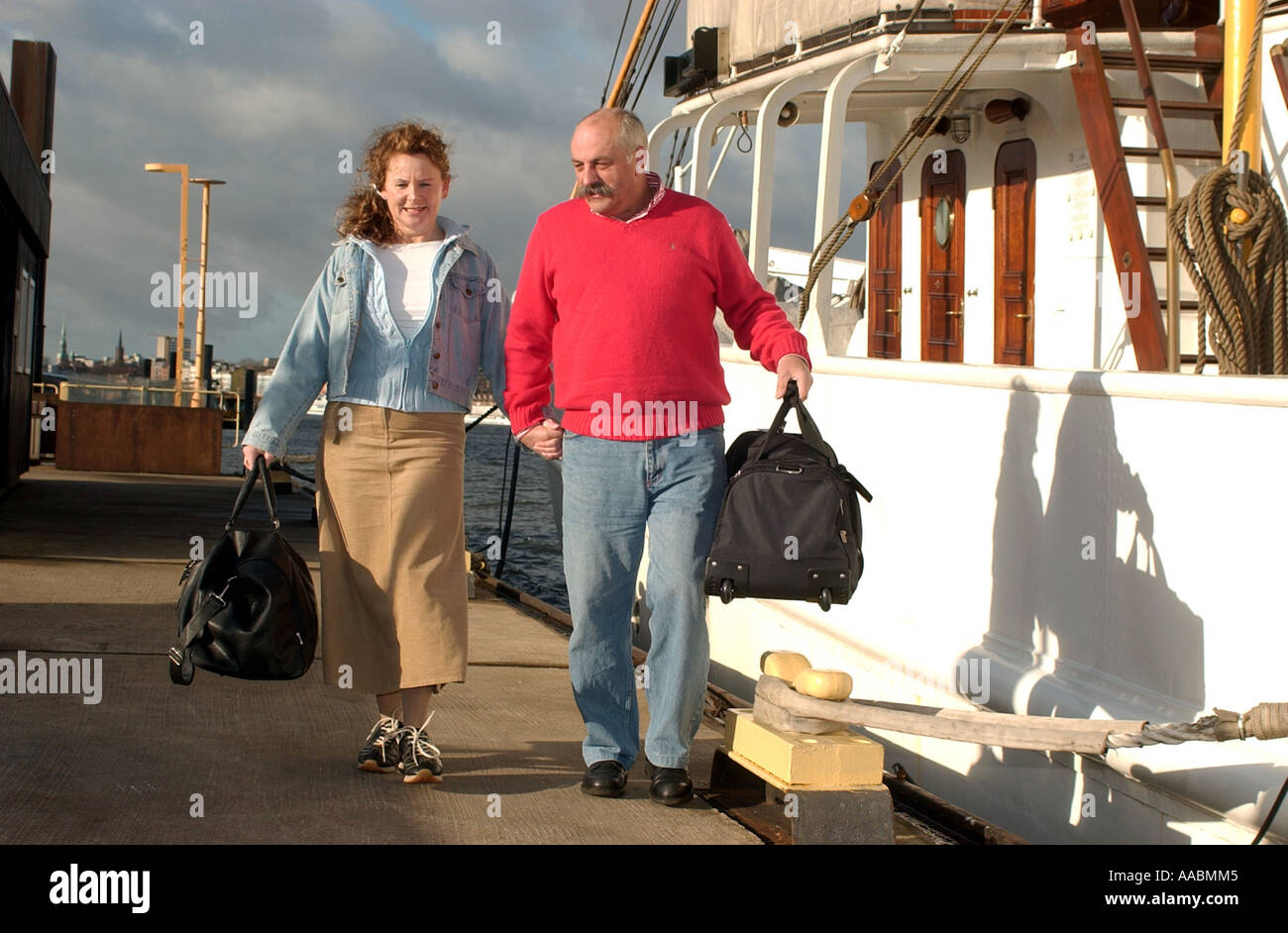Vacations for senior citizens are more than just getaways; they’re opportunities for rejuvenation, exploration, and creating lasting memories. This guide delves into the essential aspects of planning a fulfilling and safe vacation tailored to the needs and preferences of older travelers, covering everything from budgeting and health considerations to accessible transportation and choosing the ideal destination. Whether seeking relaxation or adventure, this comprehensive resource empowers seniors to embark on unforgettable journeys.
From choosing the right activity level and budget to ensuring accessibility and prioritizing health and safety, we explore the key elements that contribute to a successful senior travel experience. We’ll examine various vacation types, including relaxing retreats, moderately active excursions, and even adventurous escapades, highlighting destinations that cater specifically to senior travelers’ needs. We also offer practical advice on budgeting, transportation, and essential packing tips to ensure a smooth and enjoyable trip.
Choosing the Right Destination
Selecting the perfect vacation destination for senior citizens requires careful consideration of various factors to ensure a safe, enjoyable, and enriching experience. The ideal location balances relaxation with engaging activities, catering to individual preferences and physical capabilities. Careful planning minimizes stress and maximizes the enjoyment of this well-deserved break.
Popular Destinations for Senior Travelers
The following table showcases destinations favored by senior travelers, highlighting their unique attractions and accessibility features. These destinations cater to a variety of interests and mobility levels, demonstrating the breadth of options available.
| Destination | Type of Vacation | Key Attractions | Accessibility Features |
|---|---|---|---|
| Charleston, South Carolina, USA | Historical & Cultural | Historic architecture, horse-drawn carriage rides, charming streets, excellent dining, museums | Relatively flat terrain, accessible transportation options (e.g., trolleys), many hotels offer accessible rooms. |
| San Sebastian, Spain | Coastal & Cultural | Beautiful beaches, stunning architecture, delicious Basque cuisine, vibrant culture, historic Old Town | Relatively flat areas in the Old Town, accessible transportation within the city, many hotels offer accessible rooms. |
| Kyoto, Japan | Cultural & Relaxation | Ancient temples and gardens, traditional tea ceremonies, serene atmosphere, exquisite cuisine | While some areas may be challenging, many temples and gardens offer accessible pathways and ramps; accessible transportation options are available in the city. |
| Quebec City, Canada | Historical & Scenic | Historic Old Quebec, charming streets, stunning views of the St. Lawrence River, European flair, French Canadian culture | Cobblestone streets may present challenges, but accessible transportation is available; many hotels offer accessible rooms. |
Comparing and Contrasting Destinations
Destinations differ significantly in climate, cultural experiences, and accessibility. For instance, Charleston offers a warm, subtropical climate ideal for outdoor activities, while Quebec City experiences colder winters and more varied seasons. San Sebastian provides a vibrant coastal experience, while Kyoto offers a tranquil, spiritual atmosphere. Accessibility varies; Charleston and San Sebastian generally offer easier navigation than Kyoto, with its historic streets and sometimes uneven terrain.
The ease of access to transportation within each destination should also be considered.
Tips for Selecting a Destination, Vacations for senior citizens
Prioritizing individual interests and physical capabilities is crucial. Consider the traveler’s mobility level, preferred pace of travel, and tolerance for crowds. Research accessibility features in advance, including transportation options, hotel accommodations, and attraction accessibility. Consider consulting with a travel agent specializing in senior travel for personalized recommendations and assistance with planning. Checking weather patterns for the selected time of year is also essential, especially for those sensitive to extreme temperatures.
Furthermore, selecting destinations with readily available medical services can provide an added layer of security and peace of mind.
Packing Essentials and Travel Tips: Vacations For Senior Citizens

Planning a vacation requires careful consideration, especially for senior travelers. A well-organized packing list and a proactive approach to potential travel challenges can significantly enhance the enjoyment and safety of the trip. This section Artikels essential packing items and provides practical travel tips to ensure a smooth and comfortable journey for senior citizens.
Essential Packing List for Senior Travelers
Careful packing is crucial for a stress-free trip. Overpacking can lead to discomfort and difficulty navigating airports and accommodations. The following list prioritizes essential items and those enhancing comfort and convenience.
- Medications: Pack a sufficient supply of all prescription and over-the-counter medications, including copies of prescriptions. Carry medications in their original containers and keep them in your carry-on luggage.
- Comfortable Clothing: Choose loose-fitting, breathable clothing made from natural fabrics. Pack layers to adapt to changing temperatures.
- Supportive Footwear: Comfortable, well-supported shoes are essential for walking and exploring. Avoid breaking in new shoes on a trip.
- Toiletries: Pack travel-sized toiletries to comply with airline regulations and save space. Consider bringing hypoallergenic options if prone to skin sensitivities.
- First-Aid Kit: Include bandages, antiseptic wipes, pain relievers, motion sickness medication, and any personal medical necessities.
- Important Documents: Carry copies of your passport, driver’s license, travel insurance policy, and any necessary medical information. Store these separately from the originals.
- Personal Comfort Items: Pack items that promote relaxation and comfort, such as a neck pillow, eye mask, earplugs, and a favorite book or magazine.
- Walking Aid (if needed): If you rely on a cane or walker, ensure it’s readily accessible and easily transported.
- Small Backpack or Day Bag: A smaller bag is useful for carrying essentials during day trips.
- Electronic Devices and Chargers: Remember chargers for phones, tablets, and any other electronic devices you plan to use.
Practical Travel Tips for Seniors
Several strategies can contribute to a more enjoyable and less stressful travel experience.
- Pack Light: Minimize the number of bags you carry to reduce strain and avoid getting lost luggage. Consider using packing cubes to organize your belongings efficiently.
- Medication Management: Organize medications in a daily pill organizer or use a medication log to track dosage and timing. Inform airline personnel about any medical conditions or medication needs.
- Hydration: Drink plenty of water throughout your trip, especially on long flights or in hot climates. Dehydration can exacerbate fatigue and other travel-related issues.
- Plan for Rest: Schedule regular breaks throughout the day to avoid overexertion. Allow ample time for travel between destinations to avoid rushing.
- Communicate Your Needs: Inform your travel companions, hotel staff, and tour guides about any mobility limitations or special needs.
Preventing Common Travel-Related Issues
Proactive measures can help mitigate common travel problems.
- Jet Lag: Adjust your sleep schedule gradually in the days leading up to your trip. Upon arrival, expose yourself to sunlight and maintain a regular sleep-wake cycle. Avoid long naps during the day.
- Fatigue: Pace yourself, prioritize rest, and avoid over-scheduling activities. Consider taking short naps throughout the day if needed.
- Discomfort: Wear comfortable clothing and shoes. Use supportive aids such as a neck pillow or compression socks. Stay hydrated and take breaks when needed. Consider travel insurance that covers medical emergencies.
Planning a vacation as a senior citizen doesn’t have to be daunting. By carefully considering factors such as budget, health, accessibility, and personal preferences, seniors can curate an enriching and memorable travel experience. This guide provides a framework for planning, ensuring that the journey is as enjoyable and fulfilling as the destination itself. Remember to prioritize safety, comfort, and choose a trip that aligns with your physical capabilities and interests, making the most of your well-deserved time off.
You also can investigate more thoroughly about senior travel canada to enhance your awareness in the field of senior travel canada.


